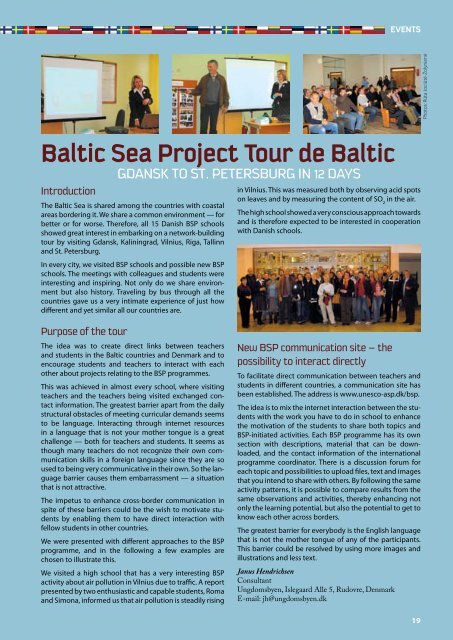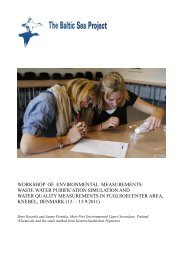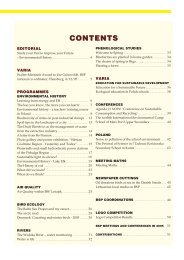newsletter_2008_1.pdf - 5.84 MB - The Baltic Sea Project
newsletter_2008_1.pdf - 5.84 MB - The Baltic Sea Project
newsletter_2008_1.pdf - 5.84 MB - The Baltic Sea Project
You also want an ePaper? Increase the reach of your titles
YUMPU automatically turns print PDFs into web optimized ePapers that Google loves.
<strong>Baltic</strong> <strong>Sea</strong> <strong>Project</strong> Tour de <strong>Baltic</strong><br />
introduction<br />
<strong>The</strong> <strong>Baltic</strong> <strong>Sea</strong> is shared among the countries with coastal<br />
areas bordering it. We share a common environment — for<br />
better or for worse. <strong>The</strong>refore, all 15 Danish BSP schools<br />
showed great interest in embarking on a network-building<br />
tour by visiting Gdansk, Kaliningrad, Vilnius, Riga, Tallinn<br />
and St. Petersburg.<br />
In every city, we visited BSP schools and possible new BSP<br />
schools. <strong>The</strong> meetings with colleagues and students were<br />
interesting and inspiring. Not only do we share environment<br />
but also history. Traveling by bus through all the<br />
countries gave us a very intimate experience of just how<br />
different and yet similar all our countries are.<br />
Purpose of the tour<br />
GDanSK To ST. PETERSBURG in 12 DaYS<br />
<strong>The</strong> idea was to create direct links between teachers<br />
and students in the <strong>Baltic</strong> countries and Denmark and to<br />
encourage students and teachers to interact with each<br />
other about projects relating to the BSP programmes.<br />
This was achieved in almost every school, where visiting<br />
teachers and the teachers being visited exchanged contact<br />
information. <strong>The</strong> greatest barrier apart from the daily<br />
structural obstacles of meeting curricular demands seems<br />
to be language. Interacting through internet resources<br />
in a language that is not your mother tongue is a great<br />
challenge — both for teachers and students. It seems as<br />
though many teachers do not recognize their own communication<br />
skills in a foreign language since they are so<br />
used to being very communicative in their own. So the language<br />
barrier causes them embarrassment — a situation<br />
that is not attractive.<br />
<strong>The</strong> impetus to enhance cross-border communication in<br />
spite of these barriers could be the wish to motivate students<br />
by enabling them to have direct interaction with<br />
fellow students in other countries.<br />
We were presented with different approaches to the BSP<br />
programme, and in the following a few examples are<br />
chosen to illustrate this.<br />
We visited a high school that has a very interesting BSP<br />
activity about air pollution in Vilnius due to traffic. A report<br />
presented by two enthusiastic and capable students, Roma<br />
and Simona, informed us that air pollution is steadily rising<br />
in Vilnius. This was measured both by observing acid spots<br />
on leaves and by measuring the content of SO 2 in the air.<br />
<strong>The</strong> high school showed a very conscious approach towards<br />
and is therefore expected to be interested in cooperation<br />
with Danish schools.<br />
new BSP communication site — the<br />
possibility to interact directly<br />
EvENTS<br />
To facilitate direct communication between teachers and<br />
students in different countries, a communication site has<br />
been established. <strong>The</strong> address is www.unesco-asp.dk/bsp.<br />
<strong>The</strong> idea is to mix the internet interaction between the students<br />
with the work you have to do in school to enhance<br />
the motivation of the students to share both topics and<br />
BSP-initiated activities. Each BSP programme has its own<br />
section with descriptions, material that can be downloaded,<br />
and the contact information of the international<br />
programme coordinator. <strong>The</strong>re is a discussion forum for<br />
each topic and possibilities to upload files, text and images<br />
that you intend to share with others. By following the same<br />
activity patterns, it is possible to compare results from the<br />
same observations and activities, thereby enhancing not<br />
only the learning potential, but also the potential to get to<br />
know each other across borders.<br />
<strong>The</strong> greatest barrier for everybody is the English language<br />
that is not the mother tongue of any of the participants.<br />
This barrier could be resolved by using more images and<br />
illustrations and less text.<br />
Janus Hendrichsen<br />
Consultant<br />
Ungdomsbyen, Islegaard Alle 5, Rudovre, Denmark<br />
E-mail: jh@ungdomsbyen.dk<br />
19<br />
Photos: Rūta Jociūtė-Žolynienė





